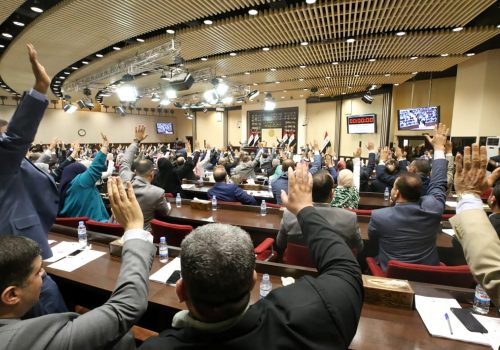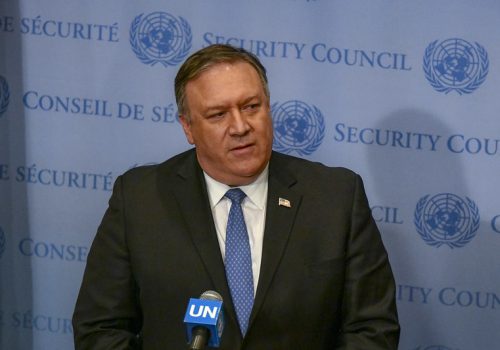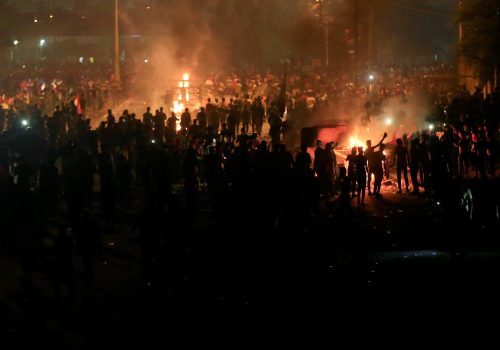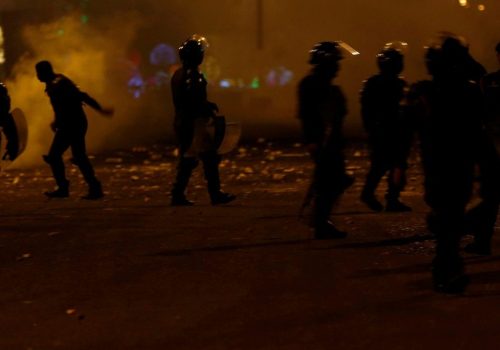Staff cuts at US embassy Baghdad will not counter Iran
If the Trump Administration had a secret plan to reduce American influence in the Middle East in favor of Iran, it would include sharply cutting key staff positions at the US embassy in Baghdad. The plan would look very much like the staff cuts in a December 6 State Department letter to the Chairman of the Senate Foreign Relations Committee, James Risch (R-Idaho). The State Department is proposing to take away key positions, including some that are necessary to help the United States counter the efforts of the Iranian Islamic Revolutionary Guards Corps’ Qods Force (IRGC-QF) to turn Iraq into another Lebanon, with political parties and politicians funded by Iran and with parallel militias under Iran’s control, not under the control of Iraq’s legitimate government.
There is, of course, no such secret Trump Administration plan. But Congress should look skeptically at the logic of the State Department staff cuts, which make permanent what were described as temporary cuts earlier this year. Congress has a right to know how these staff reductions fit into a workable US policy of trying to reduce Iran’s malign influence in the Middle East without provoking a war that no one wants.
News stories about the staff cuts refer to a 28 percent reduction in staff by the end of May 2020.
A closer look shows that the most significant reductions are in the offices that would be most involved in trying to counter Iranian influence in Iraq. The table on the last page of the letter is especially revealing:
- The Political Section drops from ten to seven. These people (plus the ambassador) are supposed to be the sharp end of the US diplomatic spear. When you factor in vacations, leave, and travel time, about half the time there will likely be only 4-5 political officers in the embassy. If this staffing plan goes into force by May 2020, IRGC-QF chief Qasim Soleimani will have more people in his security detail when he travels to Iraq than the United States Embassy has political officers in the Embassy.
- The Public Affairs Section gets cut in half from ten to five. This section has the officers trying to reach out to Iraqis through the media, including through social media. This should be the section most engaged in countering Iranian disinformation in Iraq. It is hard to follow Iraqi media from outside the country, but it is possible to partially make up for these cuts by increasing out-of-country personnel at the Global Engagement Center and the Iran-watchers in places like Dubai and Baku. The last sentence of the December 6 letter hints at this, but does not commit to specific offsetting increases.
- Regional Security Officers (RSOs) at the Embassy drop from 78 to 66. Most of the RSOs spend their time protecting the embassy, so the real hit will be to reduce the number of PSD’s helping to get Embassy officials to meetings with Iraqis. Fewer “movements” translates into fewer meetings, which quickly translates into less American influence.
- The Political-Military Section (POL/MIL) drops from six to four. This should be the office most engaged with Iraqi security counterparts to encourage efforts to bring all militias under Iraqi government control.
- Third-Country Nationals (TCNs) drop from 44 to eight. TCNs provide Arabic translation and other support to US diplomats in the field, including the non-Arabic speakers in the political and other sections. These are the people who schedule meetings and do crucial follow-up for our diplomats below the level of the ambassador, DCM, and the political counselor. This reduction is likely to make the remaining Political officers, for example, less effective.
One reason given for the staff cuts is that Iran and its proxies are threatening to attack American civilians in an effort to drive the United States out of Iraq and the region. Iran and its proxies are making such threats, but reducing staff levels in key sections is likely to convince IRGC-QF chief Qasim Soleimani and other Iranians that their pressure campaign is winning, not losing. The proposed staff cuts will likely lead Iran’s proxies to make more threats, not fewer threats.
Moreover, the proposed cuts will still leave hundreds of Americans in the Embassy, so the cutbacks will reduce the security risk only slightly. Iranians and Americans are both aware that the death of US Ambassador to Libya Chris Stevens and three other American officials in Benghazi in September 2012 led to the departure of all permanent US diplomatic personnel from Libya.
Worst of all, staff reductions play into the hands of the IRGC-QF and anti-American Iraqis. Recent widespread Iraqi protests against corruption and malign Iranian influence have revealed that Iran’s strategy of keeping Iraq under Soleimani’s thumb is unpopular with many Iraqis. Now is an opportunity for the United States to build support among Iraqis to demand a reduction of Iranian influence.
Iranian disinformation is telling Iraqis they cannot rely on the United States or anyone other than Iran, and the Trump Administration’s staff reductions will validate Iran’s claims. Not only will this dishearten any pro-US Iraqi protesters, it could lead the larger number of Iraqis who are now on the fence, to side with Iran as the likely winner. The Trump Administration should be looking for ways to increase—not decrease—US diplomatic and media contacts to support Iraqis who want to reduce Iranian influence.
A workable strategy aimed at countering Iran’s growing influence in Iraq and the region would include three things. First, it would find ways of protecting US officials while continuing to allow them to engage with Iraqis in other ways (like social media) or in other places (like Irbil, Amman, or Arab Gulf countries).
Second, it would significantly increase training for junior civilian officers in Arabic, Iraqi history and culture, and other subjects—analogous to what the US military years ago mandated for its junior officers before deployment to Iraq. This would offset staffing cuts by making US officials in Iraq more productive. So would making increased use of civil service personnel who don’t rotate as frequently as foreign service officers.
Third, the State Department, the Department of Homeland Security (DHS), and Congress should significantly increase the number of International Visitors Programs and other programs to bring selected, qualified Iraqis to meetings and conferences in the United States. If the US Government cannot meet with the Iraqis it needs to meet with in Iraq, it can at least meet with some of them here. This would require coordination on visas and travel security. DHS should set up a small Visa Security Unit in Embassy Baghdad. The proposed staffing reduction goes in the opposite direction, reducing the US Embassy Consular Section from twelve to five—an even greater percentage than the reduction in the Public Affairs Section, which normally runs International Visitors Programs.
The State Department’s December 6 staffing cuts mark the end of the John Bolton era of making our Iraq policy about Iran. President Trump’s previous National Security Adviser understood the importance of breaking Iran’s ability to use Iraq as part of Iran’s struggle against US influence, even if Ambassador Bolton’s methods exceeded what President Trump was prepared to support.
An alternative strategy would be for the Trump Administration to openly admit that its Iraq strategy has changed from Ambassador Bolton’s time, and that the United States is prepared to accept even greater Iranian influence in Iraq than Iran now has. A lower level of US Embassy staffing would then align with such a strategy. Such a strategy would have costs and consequences, but it would at least be achievable with the staffing levels proposed in the December 6 letter.
The December 6 State Department proposal making permanent the Embassy Baghdad staffing cuts accepts the certainty of reduced US influence, while hoping for reduced risk to US personnel. Congress should ask whether US strategy for Iraq and the planned staffing levels of the US Embassy are still aligned. One of them, at least, needs to change.
Thomas S. Warrick is a nonresident senior fellow with the Middle East programs at the Atlantic Council.
Related Content
Image: Iranian Foreign Minsiter, Mohammad Javad Zarif, meets with Iraqi Foreign Minister Mohamed Ali Alhakim in Baghdad, Iraq May 26, 2019. REUTERS/Khalid Al-Mousily



